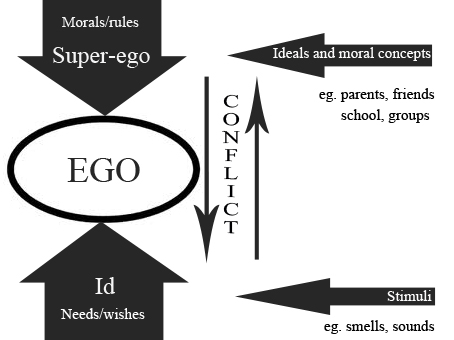Freud's model of the mind
 Freud stated that the personality consisted of three aspects: the Id, the Ego and the Super-ego.
Freud stated that the personality consisted of three aspects: the Id, the Ego and the Super-ego.
All three aspects are to be found in everybody, but in order to have a reasonable degree of mental health, they have to be well-balanced.
The problem in every person's psyche is that the Super-ego and the Id have conflicting demands.
The Ego - so to speak - is caught in the middle and has to negotiate.
The Id:
The Id functions in the irrational and emotional part of the mind. It is primitive and consists of all the basic desires, feelings and needs. Anger, joy, hunger, sexual desire etc.; all of these - and many more - are part of the Id.
Babies are 100% Id. According to Freud, they cannot control their desires and wants. "I want to eat - NOW!!!"
If the Id is too strong or uncontrolled, the person in question is driven by constant self-gratification and he/she is uncaring to others.
The Ego:
The Ego functions in the rational part of the mind. The Ego develops when a person realises that he/she cannot always get what he/she wants. The Ego relates to the real world (the "reality principle") and negotiates between the conflicting demands of the Id and the Super-ego.
If the Ego is too strong, the person in question is extremely rational and efficient, but cold, boring and distant.
The Super-ego:
The Super-ego is the last part of the mind to develop. It is the moral part of the mind, and it contains all the values and rules a person has learned during his/her upbringing and socialisation. The Super-ego - in other words - consists of parental rules, societal rules, conscience etc.
If the Super-ego is too strong, the person in question is extremely controlled - and possibly controlling -, but probably also feels guilty all the time.